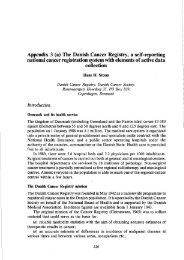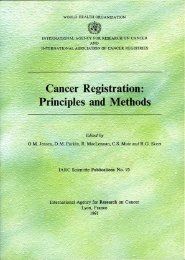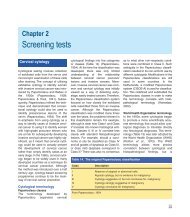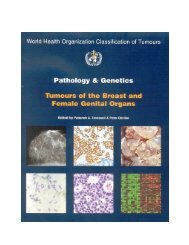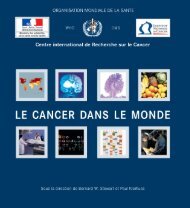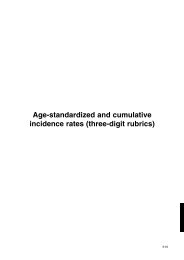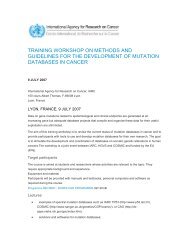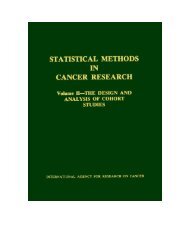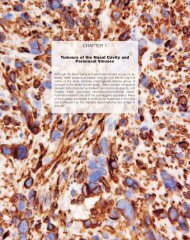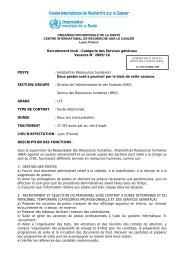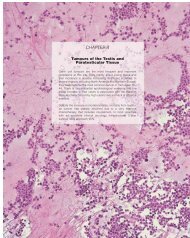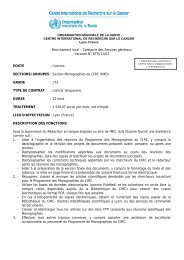world cancer report - iarc
world cancer report - iarc
world cancer report - iarc
Create successful ePaper yourself
Turn your PDF publications into a flip-book with our unique Google optimized e-Paper software.
BREAST CANCER<br />
SUMMARY<br />
> Breast <strong>cancer</strong> is the most common<br />
malignancy affecting women, with more<br />
than one million cases occurring <strong>world</strong>wide<br />
annually. Affluent societies carry<br />
the greatest risk, with incidence rates of<br />
>80 per100,000 population per year.<br />
> The <strong>world</strong>wide breast <strong>cancer</strong> epidemic<br />
has many etiological factors, including<br />
reproductive history (early menarche,<br />
late or no pregnancy), and Western<br />
lifestyle (high caloric diet, lack of physical<br />
activity).<br />
>In some regions, including North<br />
America, Western Europe and Australia,<br />
breast <strong>cancer</strong> mortality rates have started<br />
to decline, mainly due to improvements<br />
in early detection and treatment<br />
(chemotherapy and tamoxifen). Fiveyear<br />
survival rates are higher than 70%<br />
in most developed countries.<br />
> Breast <strong>cancer</strong> screening trials of mammography<br />
have shown that mortality<br />
can be reduced by up to 30%. However,<br />
there is limited evidence that this can be<br />
achieved in population-based countrywide<br />
screening programmes.<br />
Definition<br />
Breast <strong>cancer</strong> generally refers to a malignancy<br />
in women that arises from the terminal<br />
ductal-lobular units of epithelial tissue,<br />
which in the mature breast represent<br />
10% of the total volume.<br />
Epidemiology<br />
Latest estimates suggest that more than<br />
1,050,000 new breast <strong>cancer</strong> cases occur<br />
<strong>world</strong>wide annually, with nearly 580,000<br />
cases occurring in developed countries and<br />
the remainder in developing countries [1].<br />
Thus breast <strong>cancer</strong> now ranks first among<br />
<strong>cancer</strong>s affecting women throughout the<br />
<strong>world</strong> and its marked impact is not restricted<br />
to Western industrialized societies (Fig. 5.12).<br />
188 Human <strong>cancer</strong>s by organ site<br />
< 19.3<br />
< 26.1<br />
Fig. 5.12 The global burden of breast <strong>cancer</strong> in women; incidence is high in developed countries such as<br />
the USA, UK and Australia.<br />
In 1998, there were 412,000 deaths attributed<br />
to breast <strong>cancer</strong> for women in the<br />
<strong>world</strong>, representing 1.6% of all female<br />
deaths. In terms of absolute numbers, the<br />
greatest contribution is now from developing<br />
countries, where 250,000 such deaths<br />
occurred, as compared to developed<br />
countries, which account for 160,000<br />
deaths. However, the proportion of deaths<br />
due to breast <strong>cancer</strong> in women remains<br />
higher in the latter countries at 2.0% in<br />
comparison to 0.5% in the developing<br />
countries. Male breast <strong>cancer</strong> is about<br />
100 times less frequent than the disease<br />
in women.<br />
The Netherlands exemplifies the high incidence<br />
of breast <strong>cancer</strong> in developed countries,<br />
with an age-standardized incidence<br />
rate of 91.6 new cases per 100,000<br />
woman-years, but there are sub-populations,<br />
such as white women in California,<br />
which exhibit age-adjusted incidence<br />
rates of 100 or more. Overall, the incidence<br />
rate in the USA is estimated at<br />
91.4. Such high rates are also observed in<br />
Europe, Australia and New Zealand, and in<br />
< 36.0<br />
< 54.2<br />
Age-standardized rate/100,000 population<br />
< 91.6<br />
Fig. 5.13 Risk of breast <strong>cancer</strong> is decreased in<br />
women who have children early and who have<br />
breast-fed.



